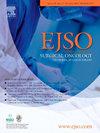Evaluating the perioperative risks in esophageal resection and reconstruction for esophageal carcinoma among elderly patients: A retrospective propensity score matching analysis
IF 3.5
2区 医学
Q2 ONCOLOGY
引用次数: 0
Abstract
Introduction
With the global aging, the number of elderly candidates for esophageal resection is increasing. However, studies on esophagectomy in elderly patients have yielded conflicting results, and individuals over 75 years old are frequently excluded from studies on esophageal cancer. This study aimed to analyze perioperative and survival outcomes post-esophagectomy in elderly patients using propensity score matching (PSM).
Materials and methods
Patients with esophageal carcinoma who underwent esophagectomy (2006–2020) were studied. A 1:2 PSM was performed, with matching variables, including operational approach, type of operation, Charlson Comorbidity Index without age score, clinical stage, and treatment modality. Perioperative and survival outcomes were compared between the age groups.
Results
After PSM, 91 elderly and 182 non-elderly patients were analyzed. The postoperative in-hospital mortality rate was identical for both groups at 1.1 %. The non-elderly group had a significantly higher 4-week discharge rate (91.8 % vs. 84.6 %, p = 0.032). There were no significant differences in overall postoperative complications (p = 0.886). Grade III–IV complications occurred in 16.5 % of elderly and 8.8 % of non-elderly patients, with no significant difference (p = 0.092). The 5-year overall survival rate was significantly lower in the elderly group (47.3 % vs. 69.8 %, p = 0.022), while the 5-year recurrence-free survival rate showed no significant difference (45.7 % vs. 63.6 %, p = 0.119).
Conclusions
Elderly patients undergoing esophagectomy were similar to non-elderly patients in overall complications and in-hospital mortality. Despite a tendency for increased severity of complications and a significantly lower 4-week discharge rate, esophagectomy remains acceptable for elderly patients.
评估老年食管癌患者食管切除重建围手术期风险:回顾性倾向评分匹配分析。
导读:随着全球老龄化的加剧,老年人食管切除术的候选者越来越多。然而,关于老年患者食管切除术的研究得出了相互矛盾的结果,75岁以上的个体经常被排除在食管癌的研究之外。本研究旨在使用倾向评分匹配(PSM)分析老年患者食管切除术后围手术期和生存结果。材料与方法:对2006-2020年食管癌行食管切除术的患者进行研究。采用1:2 PSM,匹配变量包括手术方式、手术类型、Charlson合并症指数(不含年龄评分)、临床分期、治疗方式。比较两组患者的围手术期和生存期结果。结果:经PSM治疗的老年患者91例,非老年患者182例。两组术后住院死亡率相同,均为1.1%。非老年组4周出院率明显高于老年组(91.8% vs. 84.6%, p = 0.032)。两组术后总并发症差异无统计学意义(p = 0.886)。老年患者发生III-IV级并发症的比例为16.5%,非老年患者为8.8%,差异无统计学意义(p = 0.092)。老年组5年总生存率显著低于对照组(47.3%比69.8%,p = 0.022),而老年组5年无复发生存率无显著差异(45.7%比63.6%,p = 0.119)。结论:老年食管切除术患者的总并发症和住院死亡率与非老年患者相似。尽管有并发症严重程度增加和4周出院率明显降低的趋势,食管切除术对于老年患者仍然是可以接受的。
本文章由计算机程序翻译,如有差异,请以英文原文为准。
求助全文
约1分钟内获得全文
求助全文
来源期刊

Ejso
医学-外科
CiteScore
6.40
自引率
2.60%
发文量
1148
审稿时长
41 days
期刊介绍:
JSO - European Journal of Surgical Oncology ("the Journal of Cancer Surgery") is the Official Journal of the European Society of Surgical Oncology and BASO ~ the Association for Cancer Surgery.
The EJSO aims to advance surgical oncology research and practice through the publication of original research articles, review articles, editorials, debates and correspondence.
 求助内容:
求助内容: 应助结果提醒方式:
应助结果提醒方式:


